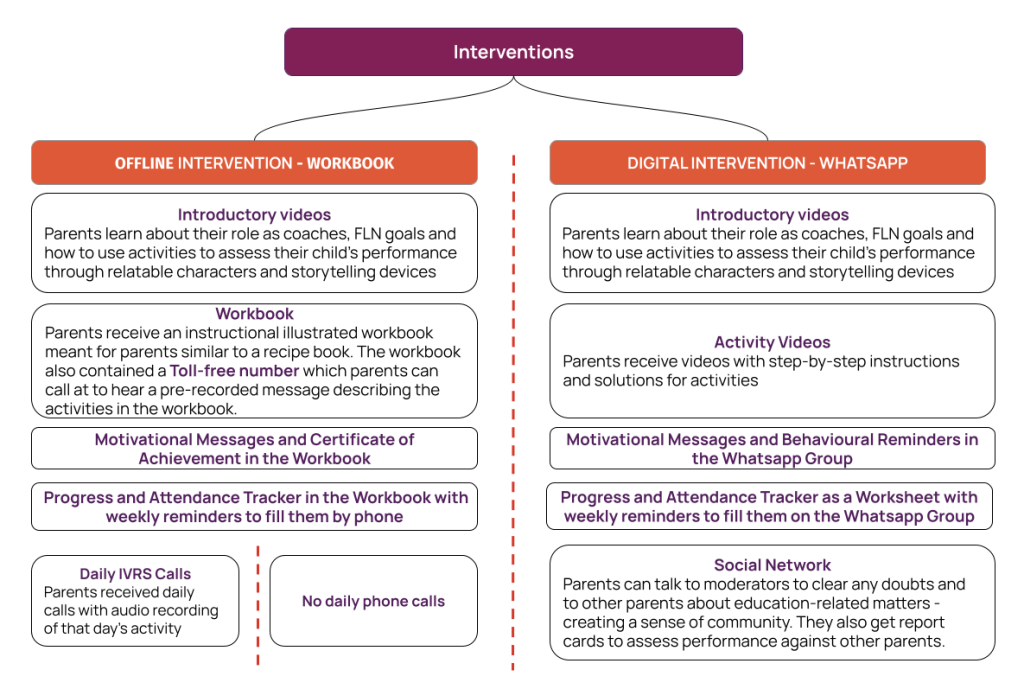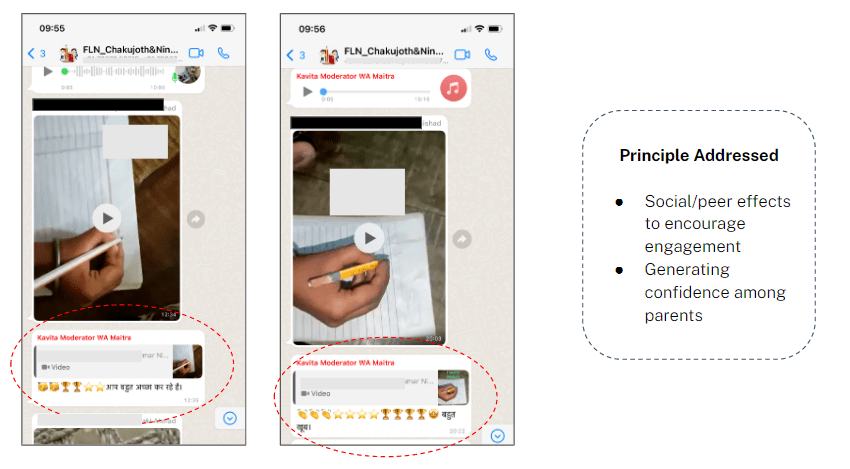 Go Back
Go BackShare
Using Behavioral Insights to Increase Parental Engagement on FLN (Part 2)
By Centre for Social and Behaviour Change (CSBC) and CSF
Mar 16, 2023
This is the second part of a two-part series on behavioral interventions to improve parental engagement on FLN. In the first part of the blog series, we described the findings from the diagnostic research conducted by CSF and CSBC, behavioral design principles for our interventions, and the workbook intervention. This article describes the WhatsApp-based intervention and key recommendations for adopting parent behavioral interventions at scale.
Parents limit their engagement with their children’s foundational learning because they lack clarity on the role they can play in it and feel under-confident to support due to their own low literacy levels. This, combined with low access to tools to support, and limited information on what children are expected to learn at different stages, reduces their involvement in education. CSF and CSBC collaborated to develop and test behavioral interventions to improve parental involvement in their children’s foundational learning. An 8-week intervention program was deployed where parents were shown videos in schools to orient them on their role, given simple tools to engage with their children on a regular basis and build their confidence. The core interventions were delivered through two modes-
(i) Offline, through parent workbooks and
(ii) Tech-based, through WhatsApp groups
In this article, we reflect on WhatsApp-based interventions and share learnings from the evaluation of the intervention pilot.

WhatsApp Intervention
Parents with smartphones were added to WhatsApp groups with other parents from their child’s school. Bite-sized videos with simple FLN-based activities were shared with parents regularly, encouraging them to try out similar activities with their children at home. The aim of the videos was to make it easy for parents to engage with their children, and provide them simple ways to assess progress on FLN. A total of 40 videos with progressively increasing difficulty levels were developed by Imperium Edutech or adapted from existing content from Rocket Learning. Solution videos or pictures with answers were also shared with parents so that they could easily check and track their child’s progress.

Parents were encouraged to share videos or photos of them doing intervention activities with their children in order to use social/peer effects to increase engagement. They also received motivational messages and reminders to complete activities and fill a progress tracker twice a week. The motivational messages were normative messages to help clarify the role of parents as coaches, build confidence, social norms and commitment through consistent engagement. Reminders were shared as text messages and voice notes over the groups to ensure that all parents could access them.

At the end of every week, report cards were shared with the group to track the number of activities parents had completed with their children for that week. The report cards served a dual purpose- they allowed parents to track progress and also helped motivate their peers to increase their engagement.

The intervention was evaluated through a randomized controlled trial with 1340 parents in Bahraich and Chitrakoot districts in UP.¹ Over the course of eight weeks of the intervention, 23.41% of parents in the WhatsApp group shared photos/videos of them doing intervention activities with their children. An evaluation was designed to measure change in parental engagement on FLN with their children, to map the impact of the intervention. This was measured through variables such as willingness to pay for FLN, narrative vignettes and confidence bias.
The narrative vignette score was calculated by asking the participants a set of 10 story style questions which described the child’s FLN skills and asked the respondents for the ideal next steps by the parent (example: If Amir can identify all the numbers shown to him on his mother’s phone and can put them in ascending order, which of these 4 things should his parents do next?). There was no obvious socially-desirable answer, instead the questions tested whether the parents answered with a course of action that took the opportunity to inculcate FLN engagement in daily activities. We also used the vignette questions to measure the effect of the intervention on parents’ confidence regarding their role in FLN instruction. This was measured by asking parents how confident they were that their answer was correct for each vignette question. The confidence bias measure was calculated as the difference between the average confidence over the vignette questions minus average accuracy. A negative value denoted underconfidence and overconfidence was denoted by a positive value.
Analysis revealed that the WhatsApp intervention positively impacted parents’ engagement on FLN. For example, the mean vignette score was 30.55% for parents in the WhatsApp intervention group and 27.20% for parents in the control group. Mean confidence bias was recorded at 0.50 in the treatment group and 0.55 in the control group. These differences are statistically significant and attributable to the intervention.

Behavioral barriers inhibit parental involvement in their child’s learning. Our study shows that providing parents clarity on the role they can play, reducing the cognitive load of engagement by giving parents simple tools to engage and build confidence, can increase parent engagement with FLN. We found that both providing the parents with the designed workbook or adding them to a WhatsApp group on which activities are shared regularly positively affected parent engagement on FLN. To operationalize this model at scale, pathways such as parent teacher meetings in schools, education melas organized by Gram Panchayats, and community volunteer models can be leveraged. Both offline and tech-based mechanisms can be used to help equip parents with information, tools and confidence to play a more meaningful role in helping children acquire FLN.
¹862 parents were in the treatment group and 478 were in the control group. 250 parents in the treatment group at baseline received the whatsapp based intervention and 143 parents were in the whatsapp control group at baseline. A total of 1017 parents participated in both baseline and endline surveys.
Keywords
Authored by
Centre for Social and Behaviour Change (CSBC)
Ashoka University
CSF
Central Square Foundation
Share this on
